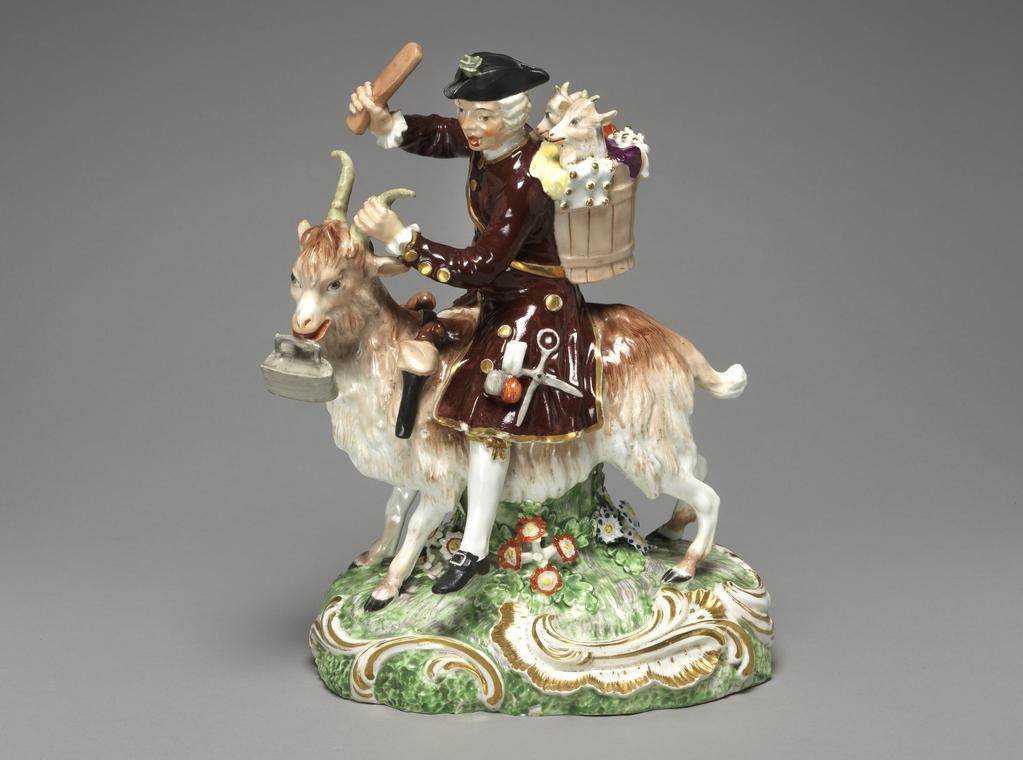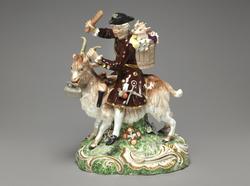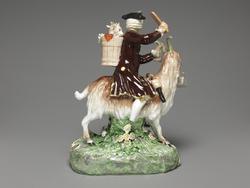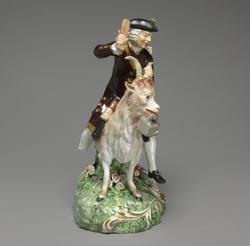Current Location: Gallery 26 (Lower Marlay)
Titles
Taylor riding on a Goat
Maker(s)
Factory:
Derby Porcelain Factory
Modeller:
Kändler, Johann Joachim
(After)
Modeller:
Eberlein, Johann Friedrich
(After)
Entities
Categories
Description
Soft-paste porcelain painted in polychrome enamels.
Soft-paste porcelain, slip-cast, with applied hand-modelled details, lead-glazed, and painted overgraze in dark blue, green, yellow, flesh, red, pale, mid- and dark brown, grey, and black enamels, and gilt. The underside has a large, circular, central ventilation hole, and has been ground down to level it so that very little glaze remains. The rounded oval mound base is moulded round the front with a rocaille frill flanked by scrolls, and rises up in the middle into a circular green stump decorated with four clumps of applied flowers and leaves. The taylor rides on a Billy goat which is going to the viewer’s left, supported underneath by the stump. He holds the goat’s left horn in his left hand and in his raised right hand holds a bat. He has a ruddy complexion, red lips, and a white wig. He wears a black tricorn hat, a dark brown coat with gold edges and buttons, gold garters at the knee of his beeches, and black shoes with buckles. A basket containing two kids is strapped to his back, and a pair of scissors, two small bags, and some rolled white material protrude from his left pocket (facing the viewer). The goat is painted in shades of brown, and has yellowish-grey horns, and black hooves. A pair of pistols is suspended in holsters on either side of its neck, and it carries a flat iron in its mouth. The base is coloured green and brown, the flowers are white and red with yellow centres, white and blue with yellow centres, white with yellow and red centres, and white with yellow centres. The scrolls and ‘frill’ are picked out in gold.
Notes
History note: Uncertain before donor, Mrs W.D. (Frances Louisa) Dickson.
Legal notes
Given by Mrs W.D. Dickson
Measurements and weight
Height: 24.2 cm
Acquisition and important dates
Method of acquisition: Given
(1932)
by
Dickson, W. D. (Frances Louisa), Mrs
Dating
18th Century, Late
George III
Production date:
circa
AD 1800
Note
This model was based on the Meissen figure by J.J. Kaendler modelled in November 1740, which was described in the factory's records as 'Schneider, welcher auf einem Ziegenbock reutet . . . wie er seinen ganzen Werckzeug bei sich führet'. Kaendler had modelled his first caricature of a Taylor riding a Goat in June 1737. The theme may have been inspired by a real incident, as it also occurs in a painting of that year by Peter Jakob Horemans, 'Festtafel vor Schlos Fürstenried' (near Munich).Traditionally, however, the figure has been identified as Count Brühl's taylor. See Documentation, Ruckert (1979) and Bradshaw (1990). The English title, The Welsh Taylor, seems to have arisen from misunderstanding of the German words welcher (who, which) or welsch (Italian, French, southern), which sound like Welsh. The companion figure of the Taylor's Wife riding a Goat, modelled by J.F. Eberlein in 1740, was also copied at Derby (see C.106-1932).
The Derby model was first made in the 1760s, and was advertised with its female companion in the Derby and Chelsea Sale Catalogue of 17 April 1771, 'One small pair Welch taylor and family riding goats, elegantly finish'd in flowers and burnish'd gold 1l. 0s.' It was reissued later in the century heavily enamelled and gilt, and standing on a scrolled base. The taylor remained popular in the nineteenth and twentieth centuries, and this was no. 73 in the King Street factory's illustrated catalogue for 1934-35.
School or Style
Rococo
People, subjects and objects depicted
Components of the work
Decoration
composed of
enamels
( dark blue, green, yellow, flesh, red, pale, mid- and dark brown, grey, and black)
gold
Base
Length 18 cm
Flowers
Materials used in production
presumed lead
Lead-glaze
Soft-paste porcelain
Techniques used in production
Slip-casting
: Soft-paste porcelain, slip-cast, with applied hand-modelled details, lead-glazed, and painted overgraze in dark blue, green, yellow, flesh, red, pale, mid- and dark brown, grey, and black enamels, and gilt. The underside has a large, circular, central ventilation hole, and has been ground down to level it so that very little glaze remains.
Lead-glazing
Inscription or legends present
Inscription present: scrip N with o raised and 62 underlined
- Text: No 62
- Location: On the underside of base to left and above the ventilation h
- Method of creation: Incised
- Type: Mark
- Text: X
- Location: On underside of base to right of ventilation hole
- Method of creation: Incised
- Type: Mark
- Text: 5
- Location: On underside of base
- Method of creation: Painted in pale purple
- Type: Mark
Inscription present: circular paper labe
- Text: FRANCES/L. DICKSON
- Location: On underside
- Method of creation: Hand-written in blue-black ink
- Type: Label
References and bibliographic entries
Related exhibitions
Identification numbers
Accession number: C.105-1932
Primary reference Number: 82425
Stable URI
Audit data
Created: Saturday 6 August 2011
Updated: Tuesday 30 April 2024
Last processed: Thursday 14 August 2025
Associated departments & institutions
Owner or interested party:
The Fitzwilliam Museum
Associated department:
Applied Arts









